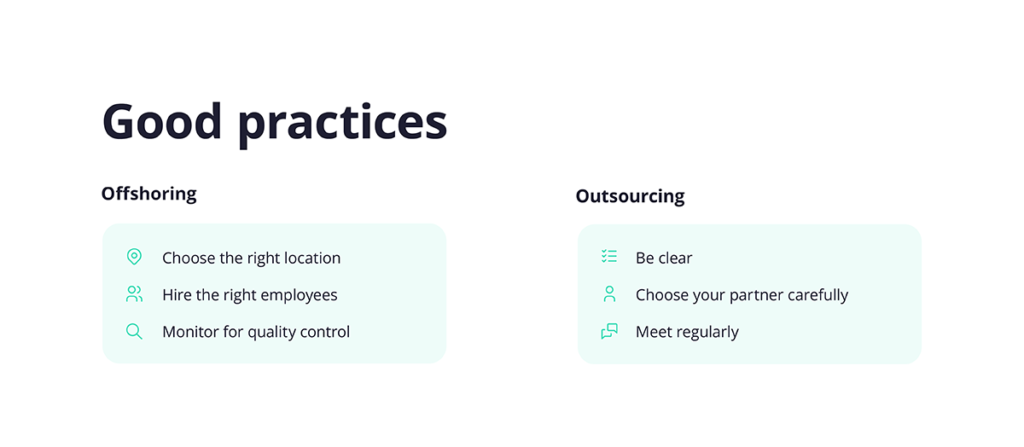Offshoring vs Outsourcing: Benefits, Differences, and Good Practices

As a business owner or manager, you’re always looking for ways to make cost savings without sacrificing quality. One way to do this is by handing certain business functions over to a third-party provider which could even be located in a different country. This is where offshoring and outsourcing come in.
As one of the most often confusing aspects of the global supply chain, some people use the terms interchangeably while others think they are completely different concepts. Keep reading if you are wondering about the differences between offshoring and outsourcing, as well as which one would be right for your business.
In this blog post, we will clear up any confusion by discussing the key differences between offshoring and outsourcing, plus the benefits that each one brings. We will also outline some good practices to follow for both cases.
Definitions of offshoring vs outsourcing
Let’s start by clarifying exactly what is meant by each of these approaches.
What is offshoring?
Offshoring is defined as the moving of business processes from one country to another, which is typically from industrialized nations to developing countries. The sorts of processes that are best suited for offshoring are usually operational or supporting types such as offshore manufacturing and accounting, respectively.
What is outsourcing?
Outsourcing means contracting specific business functions that could be performed internally out to a third party. There are many different functions that can be outsourced, but some of the most common ones include customer service, human resources, telemarketing, website design, and IT support.
What about offshoring outsourcing?
If the external outsourcing provider is located in another country, this is sometimes referred to as offshore outsourcing. On the face of it, this might just sound like a longhand way of saying offshoring, but the differences are more than subtle after scratching below the surface.
Offshore outsourcing refers to still having management responsibility for the business operations, but the third-party contracted to carry out a specific task is located in another country than your own.
For example, if your company is based in the United States but you hire a call center in India to handle customer service, that would be considered offshore outsourcing.

Differences between offshoring and outsourcing
Outsourcing and offshoring key differences are that, with the latter, businesses move entire processes from one country to another. Meanwhile, the former simply involves contracting a specific function out to a third-party provider.
Dedicated vs external staff
Offshore services, while usually contracted by the third-party provider, can be considered as dedicated employees of your organization. The employees in this case, albeit located in a different country, are essentially an extension of your internal staff who are managed directly by your company.
When companies outsource, on the other hand, they are delegating tasks via an external organization to their employees or freelancers. These individuals or teams are not typically dedicated or full time employees of your company, nor are they based in any of your offices.
Complete role vs specific task
Offshoring involves moving an entire process or role to another country, which means that the team working on that particular process will be responsible for all aspects of it from start to finish. As such, the offshore team will be a highly engaged and specialized workforce who are experienced in carrying out the complex functions required.
With outsourcing, however, you are only contracting a particular task or function out to a third-party provider and typically measuring that work in terms of time spent or quantity. The team working on that task will not be responsible for the entire process chain, but only the specific part that you have contracted them to carry out.
Fully interactive recruitment vs little involvement
Hiring offshore tends to mean a lot of involvement from your company in the recruitment process, as you will be looking for individuals who will not only represent the organization well but also fit in with the specific culture and values. It is therefore often expected that offshore staff will go through an onboarding process to get a good understanding of the company’s mission and business objectives.
Whereas, if you decide to outsource, your organization is less likely to be involved in the recruitment process because the external party will handle this. There is also generally less of an emphasis on cultural fit since the team working on your project will not be composed of dedicated employees of your company.

Quality standards vs fluctuations
Offshore employees, as dedicated staff considered to be part of your own global team, will be subject to the same quality standards and performance expectations as those in your onshore team. This means that, provided you have chosen a reputable offshore provider, you can be confident in the quality of work being carried out.
Meanwhile, there can be more fluctuations in quality with an outsourced team because the staff working on your project will not be dedicated employees of your company. This is not to say that outsourcing automatically means lower quality work, but simply that there is more potential for variation.
Long-term projects vs quick solutions
Offshoring is often seen as a long-term solution because it involves setting up a dedicated team who will work on your project for the foreseeable future. This allows for a high level of continuity and consistency in the quality of work being produced, as well as scalability of the team as your project requirements change.
Business process outsourcing, on the other hand, is often regarded as an efficient way to solve problems on an ad-hoc basis. This can be useful if you need a quick turnaround on a project or do not have the internal resources to dedicate to a long-term project.
Benefits and drawbacks of offshoring vs outsourcing
What are the benefits of offshoring?
- Reduced and predictable costs – the main motivation for offshoring is to reduce labor costs while still maintaining quality standards. These outgoings will also not fluctuate much month to month because they are based on salaries, benefits, and overhead costs.
- Improved quality – businesses can often find workers abroad who are more highly skilled than those available in their home country. This access to a larger pool of workers means that employers can be more selective about who they hire.
- In-house knowledge – offshoring gives businesses the opportunity to set up a dedicated team of workers who are based in-house and so have first-hand knowledge of the company’s culture, values, and processes.
What are the benefits of outsourcing?
- Greater flexibility – when companies outsource, they have the ability to scale up or down as needed without having to worry about laying off or hiring employees. This can be especially helpful if your business is seasonal in nature.
- More knowledge and experience – access to teams of experts in areas with specialized services means you can often get better results than you would by handling the function in-house because they have the know-how and skills needed to get the job done right.
- Focus on the core business – free up time and resources that can be better spent on growing your most important functions by outsourcing non-core or low-value business activities.
- Use of cutting-edge technology – take advantage of the latest tools and technologies with a team that utilizes them. This is a cost-effective way to stay ahead of the competition without requiring a big investment.
What are the downsides of offshoring?
- Communication difficulties – language barriers and time differences can lead to misunderstandings and frustration on both sides. Of course, the impact of these issues is minimized if you offshore to a country where people can speak the same language, and/or which is close to your own location.
- Cultural differences – what is considered polite or professional behavior in one country may not be seen as such in another. However, thanks to globalization, these cultural differences are becoming both less pronounced and troublesome.
What are the downsides of outsourcing?
Of course, there are also some potential downsides associated with outsourcing, including the following:
- Lack of Control – when you outsource a function, you’re giving up some degree of control over how it’s performed. This can be a concern if you’re outsourcing something that’s crucial to your business.
- Security risks – there’s always the potential for leaks or breaches when sensitive data processing is involved. Make sure you carefully vet any potential outsourcing partners and have robust security measures in place to protect your data.
- Loss of employment – depending on the size and scope of the project, outsourcing can result in transferring jobs outside of your organization. This is something to bear in mind, especially if you’re outsourcing domestically.
- Difficulty building relationships – it can be harder to form strong bonds with external teams, which can make it more difficult to resolve conflicts or get things done exactly as you want with outsourcing.
Offshoring vs outsourcing good practices
Regardless of whether you decide to offshore or outsource, there are certain best practices that you should follow:
- Do your research – before choosing a company or individuals to work with, check if they have experience in the type of work you need done and verify their references carefully.
- Put it in writing – create a detailed contract that outlines the expectations and responsibilities of both parties to avoid misunderstandings down the road.
- Keep communication lines open – regular contact is key to getting everyone on the same page and meeting expectations.

Offshoring good practices
When offshoring, it’s important to:
- Choose the right location – consider factors such as time zones, language barriers, and cultural differences.
- Hire the right employees – look for individuals who are a good fit for your company culture and have the specialized skills and experience needed to do the job well.
- Monitor for quality control – put in place systems to track progress and ensure that standards are being met when offshoring.
Outsourcing good practices
There are also certain best practices that you should follow when outsourcing:
- Be clear – the better you can define the scope of work and what exactly it is you need, the more likely it is that you’ll be happy with the results.
- Choose your partner carefully – read testimonials from current or previous clients of the external organization to get an idea of their quality of work.
- Meet regularly – stay in close contact with external parties to get updates on the progress of the tasks or projects they are completing and to provide feedback.
Conclusion
Offshoring and outsourcing, while similar in some aspects, are two different approaches with their own benefits and drawbacks. By understanding the key differences and following good practices, like those provided in this article, you can make an informed decision about which would be right for your business.
The key is to carefully consider your needs and choose the option that makes the most sense for you. Perhaps even the way to go would be a combination of both outsourcing and offshoring to boost your organization’s business growth.
If you’re not sure where to start, reach out to a business consultant for help making the best decision for your company. How about speaking to Codibly?
contact us
Need expert guidance on your next energy project?
Reach out to us and discover how Codibly can offer tailored solutions to drive your business.